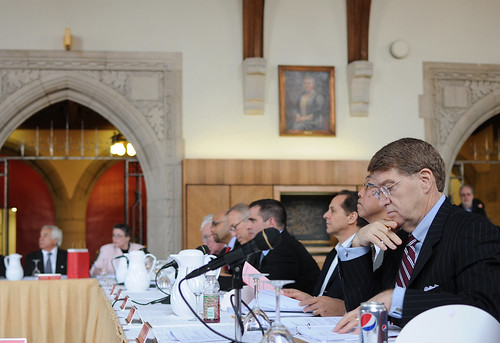
Administrators hope the board will approve new procedures at its next public session.
At the March 13 Board of Trustees meeting, the alumni relations and development committee presented a report and list of recommended changes to the current gift acceptance policy.
The changes, currently pending approval, revise the current standards of gift-giving and naming opportunities, said David Unruh, senior vice president for institutional advancement.
Though the policies needed to be updated to adhere to current charitable gift laws and align with the tuition increases throughout the past seven years, Unruh said, the committee also realizes the importance of private donations for a school like Temple.
“We do have a stated objective of securing more philanthropy for the university, in part because of the decline in state funding, and frankly because there are some things that, independent of state funding…will almost always only happen if through private investment,” Unruh said.
“So, there’s always an opportunity at a place like Temple for us to realize private investment,” he added. “I think we’re doing really exciting, dynamic things, and philanthropy has a dramatic benefit on the ability of students to pursue their education, for faculty to research, for our physicians to do their clinical service and for us to be an ever-better, higher-impacting institution.”
According to the report, 31,739 donors have given to the university so far in the 2012 fiscal year, compared to the 31,370 donors in FY 2011.
The report and recommended changes also modifies the gift-giving committee, a panel created in 2003 that reviews each gift exceeding $25,000 with a dean selected on a rotating basis, Unruh and Anthony Wagner, chief financial officer, executive vice president and treasurer, among others.
The committee can accept or reject a gift based on its intended use and whether the university has a use for it, especially regarding real estate.
“Very few gifts are ever turned down, but the purpose of the committee is to understand how is the gift being made, [if] it meets standards,” Unruh said. “The university doesn’t want to be in the business of holding real estate – things like collections of books. Before we collect and process them we have to determine if they will add to our collection.”
The report also addresses the naming opportunities for new structures and spaces at Temple – on Main Campus, as well as on satellite and study abroad campuses.
Prices are determined through several factors, including price per square foot, a weighting scale that ranks buildings like classrooms and public places higher than meeting rooms of offices, a visibility scale and gross square footage.
“There’s a number of factors that go into this, and it’s often said about fundraising that it’s both an art and a science,” Unruh said. “Every space or building does not have the same utility value or visibility value, in the sense that a classroom is used all the time.”
“So from a donor perspective, it’s central to the academic mission, it’s something that lots of people see, you know it’s going to have regular use,” he added. “So the value to that space – even if it’s the same size as another space – may be higher because the other space may be less-frequently used, or is in a different location so it won’t get as much traffic.”
The new library, set to be located where the Pavilion currently stands on Broad Street, will be open to new naming opportunities, Unruh said. The current Paley Library, if it retains the Paley name, may be renamed to Paley Hall or Paley Research Center.
“The art of that comes into the fact that not every building or every space is on the same level of attractiveness either,” he added. “So residence halls are nice buildings but they are often named for their address, they’re often named for a past president, they’re often named by picking somebody from the university’s history, whereas a new academic building or a library…that’s an attractive, central space.”
Before any gift is formally accepted, it must pass through the gift-giving committee first, then the board’s alumni development committee, which deals with fundraising, and, finally, the Board of Trustees, which has final say in the acceptance or rejection of a gift.
“In most cases, once [a gift] gets to that point, the board just accepts it,” Unruh said. “In very rare cases does the board debate or go against the recommendation of the alumni development or gift-giving committees.”
Unruh said he expects the proposed changes to the current standards to be approved by the May or June Board of Trustees meeting so they can go into effect by the next academic fiscal year.
Alexis Sachdev can be reached at asachdev@temple.edu.



Be the first to comment